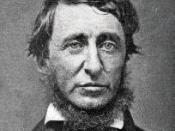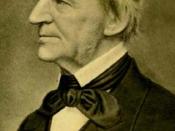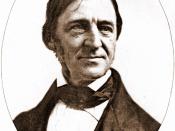Classroom Issues and Strategies
Given the difficulty students often have with Emerson's style and allusions, it seems very important to address Emerson not as the proponent of a unified philosophy or movement (e.g., Transcendentalism or Romanticism), but as a writer concerned with his audience and his peers, and constructing himself as an American scholar/poet/seer. This might lead to, for example, focusing on what specific definitions or categories Emerson faces (categories such as what is "literary" and what is "poetic," what authorizes a scholar as "learned"). And it leads to paying attention to how Emerson characterizes his audience or reading public, how he addresses their difficulties and expectations, and how he represents his "times." Working from Emerson's journals can be extremely useful in this context; students can see a writer proposing and reflecting and revising his own articulations. Emerson's vocabulary and references can be investigated not simply as a given style, but as material being tested, often being critiqued as it is being used.
His method of writing can be investigated as a self-reflective experimentation, in which Emerson proposes situations or claims, explores their implications, and often returns to restate or resituate the issue.
It can be particularly useful to have students read some of Emerson's college journals, which show his uncertainty about how to become an "American scholar" or "poet." The journals, like "The American Scholar," show Emerson teaching himself how to read differently from the ways advocated by past cultures and educational institutions. They show him sorting through the conflicting array of resources and texts available to a young man in his circumstances and times.
Students can also situate Emerson in a range of cultural relationships by using Kenneth W. Cameron's fascinating source books that reprint contemporary materials, such as Emerson Among His Contemporaries (Hartford: Transcendental Books, 1967), or...


